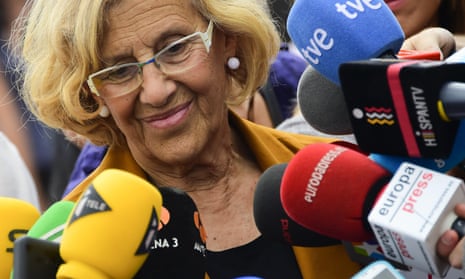A leftwing former judge backed by Spain’s anti-austerity party Podemos is to become the next mayor of Madrid, after reaching a deal with the Socialists on Friday that ends 24 years of Popular party (PP) rule in the city.
The victory of her leftwing alliance in the capital is another blow to the centre-right PP after its rout in municipal and regional elections last month, when Spaniards weary of austerity and corruption abandoned the party in droves.
The PP’s dismal results at the polls have put pressure on the country’s prime minister, Mariano Rajoy, to make changes in his party ahead of a likely parliamentary election in November.
Manuela Carmena, 71, whose appointment was announced at a news conference with the Socialists on Friday, ran an anti-corruption campaign centred on blocking the privatisation of public services and preventing household evictions in Madrid.
Despite backing from Podemos, Carmena – who was a labour rights activist during the Franco dictatorship – says she is not affiliated to any party. She told journalists she hoped to bring “a real change in the way of doing politics”.
The PP candidate and party veteran Esperanza Aguirre won most votes and seats in the 24 May vote, but was unable to secure the 29-seat absolute majority needed to take office.
Carmena’s alliance of community activists, known as Ahora Madrid or Madrid Now, is mirrored by a similar leftwing coalition in Barcelona led by the anti-eviction campaigner Ada Colau, who was confirmed on Friday as mayor of Spain’s second city.
The appointment of the two women reflects splintering political allegiances in Spain. After six years of economic crisis and a series of corruption scandals, voters are opting for new parties to break up the two-party system that has dominated the country since it became a democracy in the late 1970s.
Carmena retired from the legal profession in 2010 and set up a shop selling baby clothes sewn by former convicts. She turned down initial approaches from the leader of Podemos, Pablo Iglesias, to lead the Ahora Madrid campaign, but then consented in March.
She became the favoured candidate of bohemians and social activists. Artists created a series of posters for her during her campaign, including one of her with a Catwoman mask, a play on the nickname “cats” given to people from Madrid.
In another sign of the changing of the guard, the former PP mayor of the Mediterranean city of Valencia, Rita Barbera, said on Friday she was leaving the town hall after more than two decades.
Barbera won most votes in the city on 24 May, but fell well short of an absolute majority. A candidate from the regional leftwing party Compromis will now take over as mayor of Spain’s third city.
